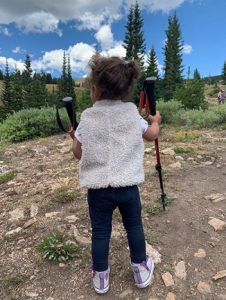Sep 20, 2019 | Your Relationships
Dear one, wounds from your past relationships can be healed when you use this process...
While I was in Colorado last month, I got to spend some incredible quality time with dear friends and business colleagues.
My colleagues inspired me with incredible new ideas for Unbounded Potential and PACK Retreats (I mean, did you see our idea to host a weekend of Authentic Relating games in December?), and I got to spend quality time with friends who have known me for all of my adult life.
One of my favorite ways to spend quality time with friends and loved ones is over a walk or a good hike. For me, there is something about experiencing nature and the outdoors combined with great conversation that makes for a wonderful way to connect with others.
One hike in particular really made an impact on me, and yet again, it had to do with children. (I know what you’re probably thinking. I promise I’m not pregnant!) I was touched by how much there is for us as adults to relearn from the children in our lives.
My goddaughter brought a friend on our hike with us one day in the mountains outside of Denver in Winter Park. The two girls are very close, so close in fact that they apparently tripped each other with their hiking poles while hiking up the mountain, leaving one girl with a scraped knee, and both girls sobbing and thinking the other didn’t want to walk next to her anymore.

Both sets of parents were present on the hike, and I was really touched when I heard them both encourage their daughter to go hug her best friend and simply say “I’m sorry.”
After a failed attempt the first time, I saw the most adorable awkward side hug, and then each girl asked the other to sit next to them. They both collapsed in awkward giggles and were again reconnected in mutual adoration. The scraped knee and bruised pride were forgotten in an instant. What a beautiful metaphor for life.
As adults, I witness so many of us (myself included) sorry for our actions or a misstep, yet afraid to apologize or to apologize sufficiently to be heard by our loved one.
We say “I’m sorry” once, and then when our partner, friend or colleague is still hurt, we remark “Well…I said I’m sorry!”
What if we could all simply give a side hug to our loved ones and simply ask them to be our friend again, and allow the bond to be more important than our wounded ego or scraped knee?
I’ve come to realize just how common it is for these scraped knees to create irreparable damages in our relationships as we age.
The physical scrape may heal, but the wound remains and carries with it a weight of unresolved “stuff” we carry with us in our day-to-day life, and in our most treasured relationships.
Do you want to learn how to transition away from letting those wounds define you? It is possible to transform those scraped knees and battle-scarred relationships, into healing — it’s through a process I’m trained in, called the DEAR process.
Bearing some battle scars from your relationships doesn’t have to define the relationship or you. When you follow the DEAR process you are demonstrating that both parties have been injured and need to be heard, and understood. This is half the battle towards healing.
Dear one here is the DEAR Process…
D stands for Declare. When there’s a breakdown in an agreement or relationship, declare it. When you’ve done something outside the confines of what’s accepted, whether it’s been agreed upon or assumed, acknowledge it. This honors the relationship and identifies that there’s been a breakdown in the integrity of the relationship. What I’ve noticed is that we oftentimes avoid declaring a breakdown because we’re afraid of being wrong or admitting fault. Admitting fault or wrongdoing is not a sign of unworthiness which we too often equate it to mean.
E stands for Exploring Impact. After we’ve acknowledged that there’s been a breakdown in the agreements, then you want to explore the impact that the breakdown has had on the other individual. Again, the intention of this isn’t to throw yourself under the bus or self-flagellate, but rather to truly get into their world. If my goddaughter was trying to explore the impact of having tripped her friend with her hiking pole, she might have shared that “When I tripped you and ran away crying, I can imagine that you thought I didn’t care about your pain and you might’ve thought you did something wrong.” Both individuals get to share the impact and be witnessed and heard by the other.
A stands for Amends. After you’ve explored the impact, you might offer to make an amends that you think might be desirable to the other person or you might request ideas for how you might make amends. My tiny little friends offered mutual amends of a hug, a good belly laugh, and sharing a bag of Doritos with their lunch. Sounds pretty lovely to me! But truly, the amends I appreciate the most are the ones that evoke laughter and connection.
R stands for Recommitting or Renegotiating. Whether you’re recommitting to agreements you’ve already stated or perhaps renegotiating new ones, this practice reestablishes integrity in the relationship by co-creating agreements you’re both committed to moving forward. So often, we assume agreements because we’re scared to ask for what we want and lean into being vulnerable. But if two little girls who are afraid of the same thing can do it, imagine what your vulnerable side has to say about the matter.
I think this practice is a simple yet powerful way to truly honor a relationship and serves as a way to demonstrate your higher commitment to the relationship than the breakdown and misunderstandings that so often lead us astray.
How can you apply the DEAR process in your life this week? Hit reply and let me know. I’d love to hear how this is working for you.
EnDEARingly yours.

Get the Essential Reading List for Ambitious Empaths
Snag a copy of our favorite confidence-building + intuition-honing business, money mindset, and leadership books to help you embrace a holistic approach to your success. Grab a cup of tea and let's reverse engineer your life, removing the hustle and grind and replacing it with more joy and leisure.
A Guide to Navigating Career Transitions as an Empath
If you’ve been tuning into the podcast recently, you’ve likely noticed that I’ve been doing things a little bit differently. I have been sharing some of my most favorite and powerful tools, frameworks, and coaching distinctions that I use with my clients and myself as I’ve been sitting with the despair, grief, and fear of what’s going on in my own country and cultures around the world. This week is no different – I want to share what can support you in a changing and unpredictable job market and periods of transition in your career, whether you’re at a place of wanting to finally leave the nine to five and pursue your own entrepreneurial dream, whether you have been laid off in this current job market, whether you’ve been fired, or whether you’ve chosen to see yourself out. These tools and exercises that I’m sharing with you today have been some of the most impactful for my clients in navigating periods of transition in the job market with intentionality, with purposefulness and with integrity. I hope you find today’s episode not only useful but as a tool to bring you a bit of peace and direction.
Visit this episode’s show notes page here.
The Prosperous Empath® Podcast is produced by Heart Centered Podcasting.





